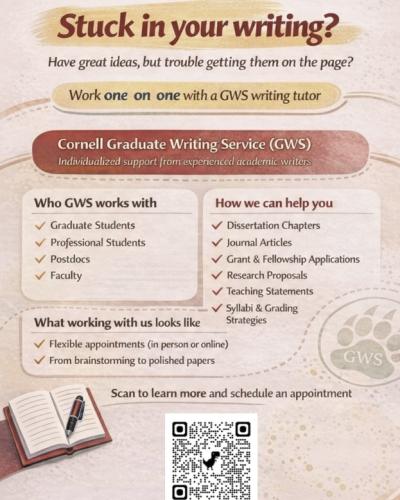When designing their courses, many first-year writing instructors contemplate if and how they should introduce first-year students to the rich research opportunities at Cornell, if and how they can seize this unique opportunity to escort first-year students through the Cornell Library gateway where they can explore one of the world's most outstanding research libraries: its vast search engines, abundant print and electronic collections, and precious special collections and archives.
So, what does it mean to teach research and research writing in a FWS? Naturally, we see wide variation across FWS course offerings -- from courses that spend the entire semester building up to a capstone research project to those that layer in discrete research activities that support engaged, critical reading of course texts, from courses in which students conduct and write about independent research topics to those in which students locate one or two sources to push their thinking in response to a particular assignment.
When helping FWS instructors to prepare for and get excited about teaching research in FWSes, my colleague, Cornell Writing Centers Director Kate Navickas, offers the four questions below as a structured way to think about the challenges associated with teaching research to first-year students:
- How can we create writing assignments that require a manageable amount of research? What can we expect from students in terms of the amount of research they can accomplish in a given time period?
- What are some options for how we can introduce research and teach students how to locate sources?
- What are some class activities that support student’s use of research in a writing assignment?
- When we are responding to research-writing (whether when grading papers or responding to drafts), what should we focus on and why?
In a recent workshop, Kate addressed these questions by focusing on the following areas: Building Assignments, Class Time & Homework, and Responding to Research Writing.
- BUILDING ASSIGNMENTS | When building assignments, less is more.
- If you are new to teaching research, consider just asking students to locate one or two sources.
- If you are nervous about helping students locate sources, teach them how to locate sources in a more precise location.
- CLASS TIME & HOMEWORK | Give students the time and space to do good research:
- Don't assign much or any additional course reading.
- Build in class time for students to share research and research strategies.
- Create class resources and encourage students to share sources.
- Ask students to write about their sources.
- Make sure that students have committed to and engaged with sources before they start writing their essays.
- The more class time and homework you assign around locating, evaluating, reading, and analyzing sources, the less likely students are to feel stuck and plagiarize.
- RESPONDING TO RESEARCH WRITING | When responding to research writing, be clear and explicit.
- Make sure that students what you expectations are and what they will be graded on.
- Provide feedback focused on:
- Does the writing explain the source with enough specificity that you understand it without having read it? (providing some summary and context for evidence)
- Does the writer establish clear connections or relationships between sources that are explained?
- Does the writer connect evidence and sources back to their main claim?
- Does the writer explain and analyze all evidence?
Follow this link to a real time GoogleDoc | Teaching Research in FWSes to learn more about these topics and for lesson planning ideas and resources. Join other FWS instructors to post ideas for additional classroom activities and instructional tools that you have tried or are considering.




